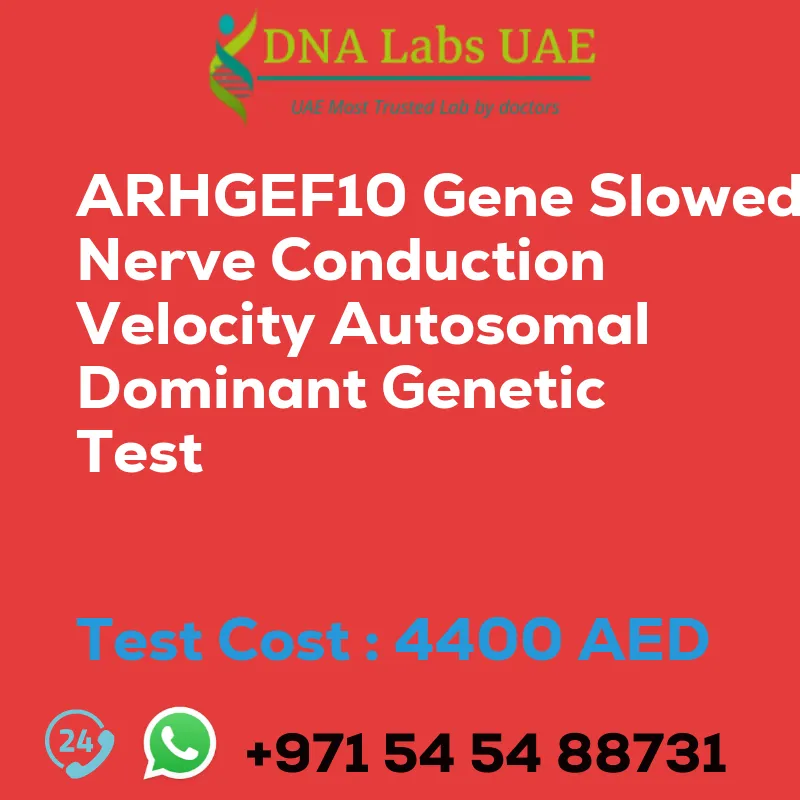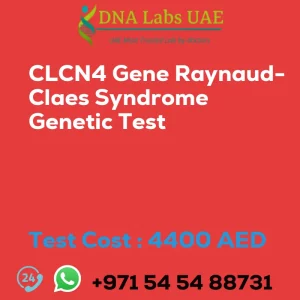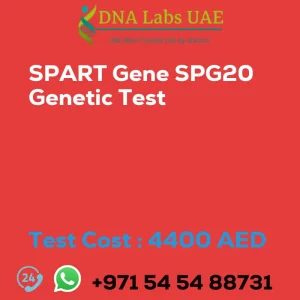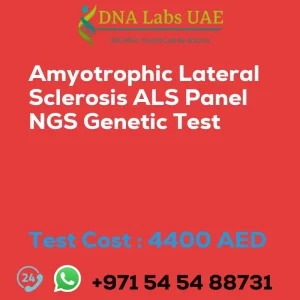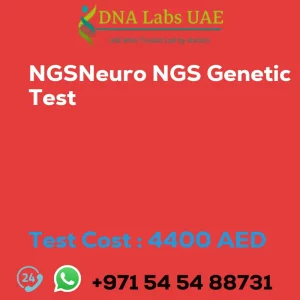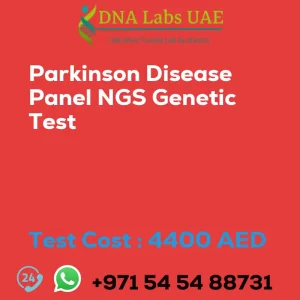ARHGEF10 Gene Slowed Nerve Conduction Velocity Autosomal Dominant Genetic Test
At DNA Labs UAE, we offer a comprehensive genetic test for the ARHGEF10 gene associated with slowed nerve conduction velocity. This test can help diagnose autosomal dominant slowed nerve conduction velocity (ADSCV) and provide valuable insights for treatment and genetic counseling.
Test Details
The ARHGEF10 gene plays a crucial role in regulating nerve cell function and communication. Mutations in this gene have been linked to ADSCV, a rare neurological disorder characterized by a decrease in the speed at which electrical signals are transmitted along nerve cells.
Common symptoms of ADSCV include muscle weakness, numbness, and difficulty coordinating movements. However, the severity of symptoms can vary among affected individuals, even within the same family.
Our genetic test utilizes Next-Generation Sequencing (NGS) technology to analyze the entire coding region of the ARHGEF10 gene. This allows us to detect any abnormalities or variations that may be present. NGS is a highly sensitive and specific method for identifying genetic mutations.
Test Components and Price
- Test Name: ARHGEF10 Gene Slowed Nerve Conduction Velocity Autosomal Dominant Genetic Test
- Price: 4400.0 AED
- Sample Condition: Blood or Extracted DNA or One drop Blood on FTA Card
- Report Delivery: 3 to 4 Weeks
- Method: NGS Technology
- Test Type: Neurological Disorders
- Doctor: Neurologist
- Test Department: Genetics
Pre Test Information
Prior to the genetic test, we recommend a clinical history of the patient who will undergo the ARHGEF10 gene test. Additionally, a genetic counseling session will be conducted to draw a pedigree chart of family members affected by ADSCV.
Implications and Treatment
Genetic testing for ADSCV can be instrumental in confirming a diagnosis, providing genetic counseling to affected individuals and their families, and guiding treatment decisions. However, it is important to note that there is currently no cure for ADSCV. Treatment focuses on managing symptoms and improving quality of life.
At DNA Labs UAE, we are committed to providing accurate and timely genetic testing services. Our team of neurologists, geneticists, and counselors are dedicated to supporting individuals and families affected by neurological disorders.
| Test Name | ARHGEF10 Gene Slowed nerve conduction velocity autosomanal dominant Genetic Test |
|---|---|
| Components | |
| Price | 4400.0 AED |
| Sample Condition | Blood or Extracted DNA or One drop Blood on FTA Card o |
| Report Delivery | 3 to 4 Weeks |
| Method | NGS Technology |
| Test type | Neurological Disorders |
| Doctor | Neurologist |
| Test Department: | Genetics |
| Pre Test Information | Clinical History of Patient who is going for ARHGEF10 Gene Slowed nerve conduction velocity, autosomanal dominant NGS Genetic DNA Test A Genetic Counselling session to draw a pedigree chart of family members affected with ARHGEF10 Gene Slowed nerve conduction velocity, autosomanal dominant |
| Test Details |
The ARHGEF10 gene is associated with the regulation of nerve cell function and communication. Mutations in this gene have been linked to a condition called autosomal dominant slowed nerve conduction velocity (ADSCV). ADSCV is a rare neurological disorder characterized by a decrease in the speed at which electrical signals are transmitted along nerve cells. This can result in symptoms such as muscle weakness, numbness, and difficulty coordinating movements. The severity of symptoms can vary widely among affected individuals, even within the same family. NGS (Next-Generation Sequencing) genetic testing can be used to identify mutations in the ARHGEF10 gene and confirm a diagnosis of ADSCV. This type of testing involves sequencing the entire coding region of the gene to detect any abnormalities or variations. It is a highly sensitive and specific method for identifying genetic mutations. Genetic testing for ADSCV can be useful in confirming a diagnosis, providing genetic counseling to affected individuals and their families, and guiding treatment decisions. However, it is important to note that there is currently no cure for ADSCV, and treatment is focused on managing symptoms and improving quality of life. |

